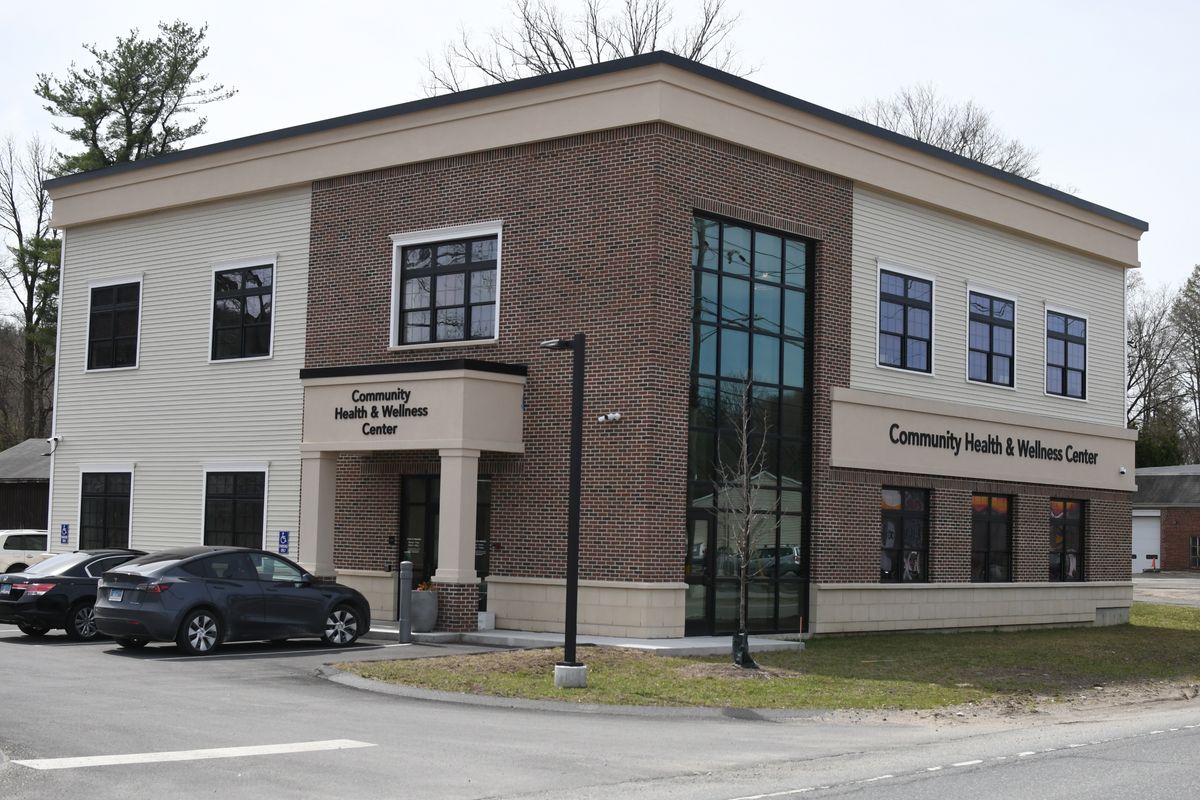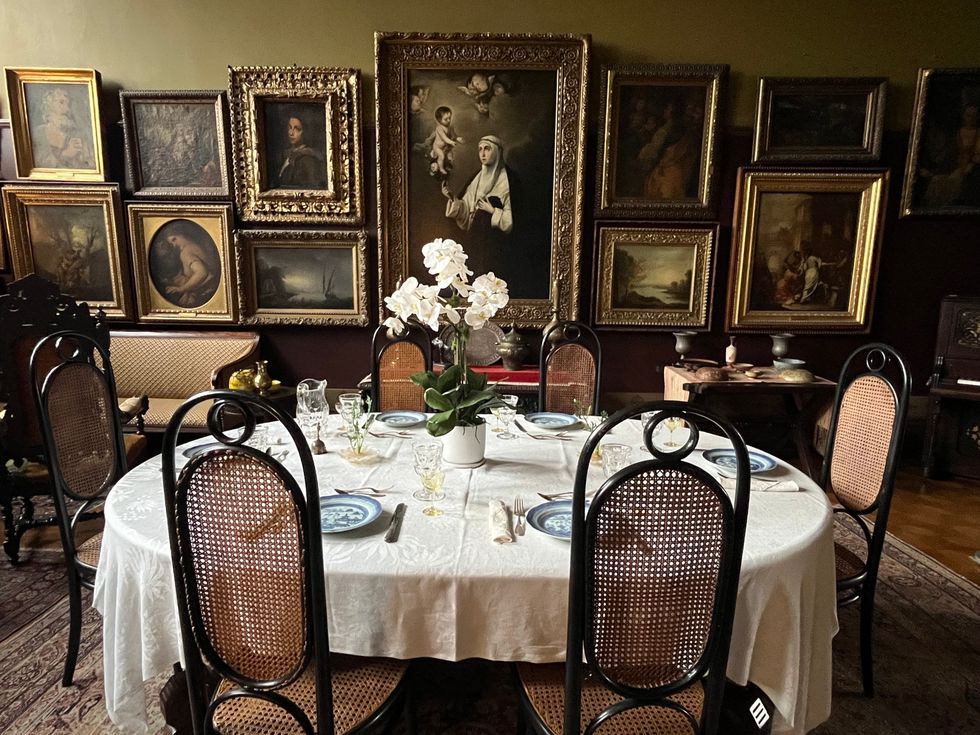Community Health & Wellness, Wheeler Health explore potential new network

The Community Health and Wellness Center on Route 44 in North Canaan.
Riley Klein

The Community Health and Wellness Center on Route 44 in North Canaan.
NORTH CANAAN — In an effort to expand access to health care services in the state’s rural northwestern communities, two federally qualified health centers (FQHC’s) have signed a letter of intent to evaluate combining services into one network.
Community Health & Wellness Center, based in North Canaan, Winsted and Torrington, and Wheeler Health, an FQHC in Bristol, Hartford, New Britain, Plainville and Waterbury, are exploring the partnership to “significantly increase” health care services for residents in Torrington and the Northwest Hills region, according to a joint announcement late last month.
“FQHC’s are experiencing an ever-expanding patient population, increasing the demand on already strained resources, especially in our rural parts of the state,” said Joanne Borduas, who serves as president and CEO of Community Health & Wellness Center.
“Established over 25 years ago, we have been serving as the only comprehensive FQHC in Northwest Connecticut, and today, operating under continued uncertainty of future federal funding supports,partnerships like this one are a smart strategic option that will strengthen our ability to better plan for future sustainability, invest in long-term care solutions and expand services while honoring our commitment to the communities we serve.”
Sabrina Trocchi, president and CEO of Wheeler Health, noted that her organization and CHWC bring a “shared vision of high-quality, accessible and compassionate integrated health care.Wheeler’s proven success in its care model, and more than 55 years of innovation, pairs perfectly with CHWC’s knowledge of their communities and health center services already offered.”
Discussions are underway
By joining forces, leaders of the organizations are looking to expand access to care across a broader service area, deepen service offerings and specialty care and strengthen operational stability.
Management from both organizations are currently meeting to discuss commonalities and dynamics of the potential agreement.
“We agreed to enter a due diligence period which will help us to determine if a merger of our two organizations makes sense,” noted CHWC’s Borduas, who was appointed last November by Gov. Ned Lamont to the 38-member Health Care Cabinet (HCC) as a representative of community health centers across Connecticut.
“This is a commitment, to our combined patients, communities and staff, to be at the forefront of improving health care for all,” said Wheeler CEO Trocchi.
If talks proceed as planned, the creation of a new entity would likely take place next summer, according to Allison Separy, CHWC’s marketing and communications manager.
At this point the two health centers, she said, are in the early stages of evaluating operations, and are still determining what the new network will look like.
Under a merger, “they will continue to operate at each of their respective sites,” but would do so under one entity, said Separy, who noted that there are no plans to relocate staff from either location.
Separy said a merger would enable the FQHC’s to expand their network of service offerings for referral to services that either one of the organizations today, may not have immediate access to or have waitlists in place.
As examples, she said, Wheeler currently offers certain behavioral health services for depression that CHWC does not, such as the FDA-approved nasal spray, Spravato, used for adults with treatment-resistant depression, and Transcranial Magnetic Stimulation, or TMS.
“Our patients would now have easier access to these treatments if needed,” said Separy.
An uncommon strategy for Connecticut FQHC’s
Deb Polun, Chief Strategy Officer for the Community Health Center Association of Connecticut (CHC/ACT), which represents 16 FQHC’s in Connecticut, said while she is aware of health center mergers in other states, she does not recall a merger between Federally Qualified Health Centers in Connecticut in recent decades.
“It’s certainly possible that other health centers could consider this in Connecticut. Although we have been successful in achieving a plan for higher Medicaid rates here, there are still many challenges for health centers, including from the federal level.”
A recent survey by the National Association of Community Health Centers found that 85% of FQHC’s are facing financial and operational strain, with many anticipating staff reductions and service cutbacks.
According to the Geiger Gibson Program in Community Health, the financial jeopardy is so severe that a significant portion of the nation’s health centers are at risk of closing or having to reduce their operations.
Healthcare advocates in Connecticut fear current challenges could lead to disruptions in care, especially for underserved communities which rely on FQHC’s for safety-net services, potentially resulting in increased disease severity and higher healthcare costs.
About Community Health & Wellness Center
CHWC is an award-winning 501(C)(3) not-for-profit organization and the only FQHC in the northwest corner of Connecticut providing comprehensive services. CHWC delivers a range of integrated healthcare services including medical, behavioral health, chiropractic, and nutrition, as well as an in-house lab and pharmacy. Serving more than 7,000 patients, CHWC operates health centers in Torrington, Winsted and North Canaan, with school-based health centers in all Torrington schools and three Region One Schools.
About Wheeler Health
Wheeler Health’s integrated approach to primary and behavioral health, education and recovery creates “measurable results, positive outcomes and hopeful tomorrows” for nearly 70,000 individuals across Connecticut annually, according to a statement announcing the signing of a letter of intent with CHWC.
Wheeler offers medical and dental care, behavioral health, addiction treatment, chiropractic care, nutrition services, community services and special education services throughout five locations.
“This is a commitment, to our combined patients, communities and staff, to be at the forefront of improving health care for all,” said Trocchi. “We are committed to transparency as we listen, learn, share and discover the possibilities. Together, we can measurably improve the health of Torrington and the Northwest Hills communities.”
John Harney, president of the Salisbury Housing Trust, presents Jocelyn Ayer, executive director of the Litchfield County Centers for Housing Opportunity, center, and U.S. Rep. Jahana Hayes, 5th District, with local maple syrup. Hayes was in Salisbury Thursday to tour one of the trust’s latest houses on Perry Street.
SALISBURY — Congresswoman Jahana Hayes (D-5) admired the kitchen cabinets, the sunlight streaming through the large windows and an airy room well suited for flexible living space.
She toured the new affordable home at 17 Perry St. on Thursday, Jan. 29. The house, recently completed by the Salisbury Housing Trust, is awaiting a family to call it home. The modular home is one of four erected in Salisbury through the Litchfield County Center for Housing Opportunity’s Affordable Homeownership Program for scattered sites. Houses were also built in Norfolk, Cornwall and Washington.
Jocelyn Ayer, director of the center, joined members of the housing trust and First Selectman Curtis Rand in welcoming Hayes and explaining how the project came together. Rand said the property was the site of a dry-cleaning establishment located in the center of a residential area. “It was owned by two people who walked away from it. It took 15 years before we took the initiative to do something. We didn’t want to foreclose until we were sure we had someone to share in the cleanup.”
That partner was the state Department of Economic and Community Development, which provided a grant. Once the contamination was abated, a process that took five years, the town gave the property to the trust.
Hayes commended the town, saying, “I’m surprised you took the risk.”
Ayer said the critical pieces in making the project happen were the town donating the land and the Planning and Zoning Commission approving two homes on the Perry Street lot. She also thanked Hayes for her support in securing some federal funding toward the project.
“Other towns are jealous of the support we have here,” Ayer told Hayes, which includes help from the town, state and federal government.

Each of the houses costs $250,000. The trust retains the land on which they sit. The cost to build each house was $500,000, said Ayer. So far, two of the four Salisbury homes are occupied. Those eligible must be first-time homeowners.
Heat is provided by mini-split units in each room. The houses run on electricity and Ayer said the trust is exploring solar options. “We have $40,000 for each house, but we’re having a hard time getting bids near that.”
Jennifer Kronholm Clark, vice president of the trust, described the families who are already occupying the two houses. Just next door at 19 Perry St. is a young family with two children, one born recently. The mother grew up in Salisbury and “this is a wonderful opportunity for her to raise her children where she was raised. It’s a beautiful story.”
The family in one of the Undermountain Road houses has three boys who are thrilled to have a playground practically in their front yard, said John Harney, president of the trust. When the town conveyed that parcel, it stipulated that the existing playground remain.
Even with the $250,000 price tag, which is considered affordable in today’s housing market, Ayer said there has been a lot of interest expressed, but many just cannot afford to buy because they are unable to secure a mortgage. Hayes noted the guidelines have to be adjusted, adding that while affordable housing has always been an issue, “it’s getting to the top of the priority list.”
She lauded Ayer for all the work she does to promote affordable housing, telling her “You have a great vision. I’ll keep going to bat for you. I’ll keep trying to get federal money.”
As she was about to leave, Hayes was presented by Harney with what he called “liquid gold” — maple syrup made by Dolores and Champ Perotti of East Canaan. He also had a bottle for Ayer.
Those who may be interested in applying for the homeownership program should contact Ayer at 203-579-3180.
A judge recently dismissed one lawsuit tied to the proposed redevelopment, but a separate court appeal of the project’s approval is still pending.
LAKEVILLE — A Connecticut Superior Court judge has dismissed a lawsuit filed against Salisbury’s Planning and Zoning Commission challenging a zoning amendment tied to the controversial expansion of the Wake Robin Inn.
The case focused on a 2024 zoning regulation adopted by the P&Z that allows hotel development in the Rural Residential 1 zone, where the historic Wake Robin Inn is located. That amendment provided the legal basis for the commission’s approval of the project in October 2025; had the lawsuit succeeded, the redevelopment would have been halted.
The decision, issued Jan. 29 by the Superior Court in Torrington, rejected a claim brought by Wells Hill Road residents Angela and William Cruger seeking to nullify the amendment. The Crugers filed the lawsuit in March 2025, arguing the regulation was improperly adopted and amounted to illegal spot zoning intended to benefit the project’s developer, Aradev LLC.
The zoning amendment drew scrutiny when it was adopted, with opponents asserting it was crafted specifically to enable the Wake Robin Inn project. Town officials and land use staff, however, repeatedly said the change was years in the making and intended to address zoning nonconformities affecting historic inns throughout Salisbury.
In a memorandum of decision, the court found the plaintiffs failed to meet their burden of proof that proper notification was lacking. The judge wrote that “a close examination of the record” showed the Crugers did not demonstrate that public notice of the zoning change was procedurally deficient, unduly vague or untimely filed.
The dismissed case is the first of two legal challenges filed by the Crugers related to the Wake Robin Inn redevelopment. A second lawsuit — an appeal of the P&Z’s approval of Aradev’s application to redevelop and expand the inn — remains pending before the court.
Former Planning and Zoning Commission Chair Michael Klemens said that Thursday's ruling brought vindication. In a Jan. 30 email to the P&Z and commission attorney Charles Andres, Klemens said the lawsuit was largely based on claims that he and Land Use Director Conroy had misled the public and the commission during the regulatory process.
“So not only are the regulations recognized by the Superior Court as legally adopted,” Klemens wrote, “but the aspersions cast upon the integrity of staff and your immediate past chair are hopefully finally put to rest.”
Andres informed the Land Use Office and current P&Z Chair Cathy Shyer that the Crugers have 20 days to challenge the court’s ruling.
Under the approved plan, Aradev would redevelop the Wake Robin Inn to include a new detached 2,000-square-foot cabin, event space, a sit-down restaurant and fast-casual counter, as well as a spa, library, lounge, gym and seasonal pool. If built, the project would increase the number of guest rooms from 38 to 54.
Olana State Historic Site, the hilltop home created by 19th-century Hudson River School painter Frederic Edwin Church, rises above the Hudson River on a clear winter afternoon.
On a recent mid-January afternoon, with the clouds parted and the snow momentarily cleared, I pointed my car northwest toward Hudson with a simple goal: to get out of the house and see something beautiful.
My destination was the Olana State Historic Site, the hilltop home of 19th-century landscape painter Frederic Edwin Church. What I found there was not just a welcome winter outing, but a reminder that beauty — expansive, restorative beauty — does not hibernate.
2026 marks the 200th anniversary of Church’s birth, making this a particularly timely moment to take in what he created during his lifetime. Church — one of the most notable artists of the Hudson River School movement — was an accomplished landscape painter who gained a reputation as an artist-traveler.
From South America and Western Europe to the Middle East and the Caribbean, Church sought out dramatic, epic scenes that he could capture on canvas and bring back to the U.S. to sell. The profits from those works, in turn, allowed him to create a breathtaking masterwork of his own: Olana.
Olana rises above the Hudson River like a mirage, its Persian-inspired facade an unexpected sight amid the barren winter landscape. With miles of trails, visitors can take in the natural splendor of rolling hills and the river from every angle. From the house itself, the view stretches across the Catskills, a layered panorama of soft blues and silvers that appears all the more dazzling in winter.

Inside the home, the sense of awe deepens. Olana’s interior is rich with color, pattern and texture — warm reds, stenciled walls, intricate woodwork — a striking counterpoint to the monochrome world outside. Light pours through tall windows, framing the Hudson Valley like living paintings.
Every corner of the house pays tribute to the far-flung places Church visited throughout his career. From architectural details to the objects he collected and displayed, visitors are transported to another world. Walking from room to room feels less like touring a house museum and more like stepping into the mind of an artist transfixed by the staggering beauty of the world around him.
As I made my way back down the hill, the winter light fading fast, I felt refreshed in a way that only comes from seeing something anew. Olana is not just a monument to one artist, but a testament to a way of viewing the world — one that values observation, patience and reverence for the natural environment. For those looking to venture out during the colder months and to be reminded why this region has inspired generations of artists and dreamers, there may be no better place to start than Olana.
Olana State Historic Site is located at 5720 State Route 9G, Hudson, New York. For more information and to purchase tours, visit: olana.org

Berkshire Hills Ski League includes Washington Montessori School, Indian Mountain School, Rumsey Hall and Marvelwood School.
CORNWALL — Mohawk Mountain hosted a meet of the Berkshire Hills Ski League Wednesday, Jan. 28.
Housatonic Valley Regional High School earned its first team victory of the season. Individually for the Mountaineers, Meadow Moerschell placed 2nd, Winter Cheney placed 3rd, Elden Grace placed 6th and Ian Thomen placed 12th.
The league includes a mix of private and public schools. HVRHS competed against Washington Montessori School, Indian Mountain School, Rumsey Hall and Marvelwood School.

Conditions were ideal for slalom skiing at Mohawk, albeit cold for spectators with the temperature in the teens. Approximately 20-inches of snow fell earlier in the week.
Mohawk will continue to host weekly meets of the BHSL each Wednesday through the end of the season. The league championship will take place Feb. 25.
